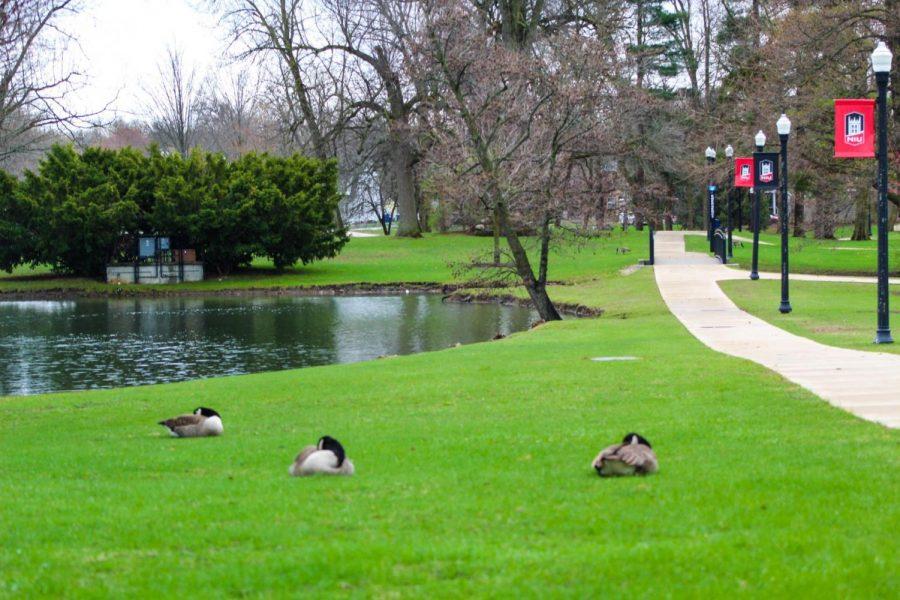Interactions with geese can be peaceful
April 25, 2019
Every spring, campus shares its grounds with Canada geese at the height of their mating season. Despite constant battles over turf, it is no secret the geese do not plan on giving up their territories. Many students can attest to the presence of aggressive, territorial geese, having encountered them on the way to class. Some students, however, do not handle these encounters in a positive way.
“There are certainly a lot of geese; they’re very pervasive,” Taylor Coffey, junior industrial systems engineering major, said.
The geese on campus are a subspecies of the common Canada goose, called the Giant Canada goose.
John Kanter, senior wildlife biologist for the National Wildlife Federation, said the goose population was once thought to be extinct.
Efforts to restore their population were prompted in Minnesota in the 1970s, according to the U.S. Fish and Wildlife Service. Kanter said their numbers multiplied significantly since the restorative efforts, but the same presence of biologists who initially helped replenish the geese are now working to lower numbers.
The geese, however, are not the only culprits in some sour human-goose interactions. Some students respond to geese’s behavior with their own displays of aggression or go as far as to provoke geese to post reactions on social media. This only makes the issue worse because it teaches the geese to view students as a threat and to be more aggressive in protecting their nests.
“Sometimes people throw stuff at them from the bridges [near] the library,” Coffey said. “Some people get aggressive with them and run away when the geese are flying toward them.”
Geese are aggressive because their instincts tell them they have to be; students have a choice. Some students make the disappointing choice to throw objects at innocent animals.
“The geese that aggressively approach humans are likely males protecting their nests, while their female partners incubate eggs,” Kanter said.
Students who encounter geese should give them space, show you are holding your ground with your posture and walk right past. Geese who approach humans are showing where the end of their comfort zone lies and letting us know the eggs they are protecting are in the vicinity.
“Canada geese are federally protected under the Migratory Bird Treaty Act,” Kanter said. “[This means] you cannot kill, harm, harass or worry protected birds.
Students living on a diet of store-bought ramen noodles might find harassing a goose in any way may come at too high a price.
It is a misdemeanor to violate any provision of the Migratory Bird Treaty Act, according to the Animal Legal & Historical Center via Michigan State University
“[To] knowingly (attempt) harm, pursue, hunt, take, trap, ensnare, capture, kill a protected bird species may warrant a fine of up to $15,000, and up to a year in prison,” according to the Animal Legal & Historical Center via Michigan State University
Acting violently towards any animal is a crime for a reason because someone capable of harming an animal may very well be capable of harming humans in the same ways. Antagonizing animals, geese especially, should not be typical of Northern Illinois University. “Forward Together” doesn’t entail harassing innocent animals.
“The university expects students to follow the norms that are used to safeguard them in any scenario,” Keerthana Kammari, graduate student of management information systems said. “Students should cooperate and [vocalize to the administration] when there’s any sort of an issue, instead of creating more of an issue and messing around.” Students who are cruel in their encounters with geese set a malicious example of NIU, and would be better off claiming accountability for their role in how these interactions could unfold peacefully.
Kanter said the landscaping on campus is an ideal Canada goose habitat. Ideal layouts for geese consist of large, well-nourished areas of grass near bodies of water, like the lagoon. These spaces provide perfect grazing conditions, as well as ample foliage to make nests. The culmination of these circumstances allows Canada geese to maintain abundant populations. Contrary to their protections, Giant Canada geese aren’t actually migratory- which makes sense as to why the geese stay year round. The geese won’t be leaving any time soon, at least not without substantial landscaping efforts to make campus less appealing to them.
The geese are living beings, just like students and faculty, and they happen to co-inhabit our campus alongside us. Consider treating the geese with the same respect you would treat a pet of your own- it will make for a more compassionate, peaceful campus atmosphere.
Students and faculty are encouraged to make peace with the geese and should report instances of animal cruelty to the DeKalb Police at 815-748-8400.







